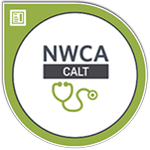PURPOSE
The Assisted Living Technician certification documents the basic competencies involved in providing care of individuals in the home setting. This credential is beneficial to medical assistants, nursing assistants, home health aides, personal aides, and licensed nurses who provide personal care and limited medical care assistance in a assisted living or residential care facility.
AUDIENCE
Any medical or non-medical individual who provides care for residents in the assisted living or residential care environment will benefit from this credential. These professionals include non-medical care providers, medical assistants, nursing assistants, nursing professionals, personal care assistants, and others who work specifically in the residential environment.
JOB/CAREER REQUIREMENTS
Assisted living technicians help people who are disabled, chronically ill, or cognitively impaired and who are living in residential communities. They also help older adults who may need assistance to remain somewhat independent in independent living communities. They help with activities such as bathing, toileting, and dressing, and provide services such as light housekeeping, meal planning, and transportation. In some states, care assistants are able to assist residents with taking medication or check the resident’s vital signs under the direction of a nurse or other healthcare practitioner. Positions are in independent living communities, assisted living communities, and nursing homes. Individuals in these positions assist the resident in helping themselves with activities of daily living, ensure the resident is living in a safe and supportive environment, and provide companionship and family support; they do not provide direct medical care.
ASSISTED LIVING TECHNICIAN WORKPLACE TASKS
- Administer bedside or personal care, such as ambulation or personal hygiene assistance
- Prepare and maintain records of resident progress and services performed, reporting changes in resident’s condition to manager or supervisor
- Perform housekeeping duties, such as cooking, cleaning, washing clothes or dishes, or running errands
- Care for individuals or families during periods of incapacitation, family disruption, or convalescence, providing companionship, personal care, or help in adjusting to new lifestyles
- Perform healthcare-related tasks, such as monitoring vital signs and assisting with medication, under the direction of registered nurses or physiotherapists
- Assist residents with eating and drinking to ensure proper nutrition and hydration
- Provide residents with help moving in and out of beds, baths, wheelchairs, or automobiles and with dressing and grooming
- Transport residents to locations outside the home, such as to physicians' offices or on outings, using a motor vehicle
- Participate in case reviews, consulting with the team caring for the resident, to evaluate the resident’s needs and plan for continuing services
- Train family members to provide bedside care
- Direct residents in simple prescribed exercises or therapeutic modalities or in the use of braces or artificial limbs
- Design, facilitate, and market activities and programs for assisted living residents
EXAM STRUCTURE OVERVIEW
Number of Questions in Exam: 120
Total Time: 120 minutes
Overall Passing Score: 70%
(All sections require an individual passing score of 70%)

